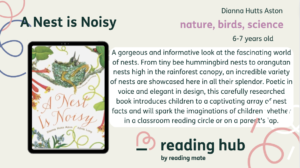Before we get started, are you always on the lookout for KS1 resources to support your early readers? We’ve got you covered. Check out these activity ideas to compliment Dianna Hutts Aston’s A Nest is Noisy.

As a keen reader, it is possible that you can take the skill of reading completely for granted. Like many things in life, when it comes naturally to you, it feels easy. But for those children that have difficulty reading, it can feel like an impossible and even terrifying task.
It’s imperative for teachers to spot the early signs or issues with reading. Though it’s equally as important for a parent to see them too. Early diagnosis is the best and most efficient way of supporting or even preventing reading problems. This will ensure that their confidence and attitude towards reading won’t be entirely dismantled. It also means there’s a greater chance of overcoming it.
If you find your child exhibits any of these signs over time, make sure to discuss them with an educational or medical professional.
- Has a difficulty with rhyming words (hat / sat / pat). Making links between these words and saying them correctly is not something that comes naturally and certainly needs practice. If you notice your child has difficulty processing the sounds of language after working on it, this could be a sign of dyslexia or apraxia of speech (motor speech disorder).
- Can’t remember sight words (the / a / her / to / it / was / for). These are words children should learn recognise early on. These words are taught so readers can easily read sentences without having to stop and sound them out each time.
- Doesn’t read the ending of words (-s / -ing / -ed). If you notice your child is missing the ending of words in their speech, this could be a signifier of a phonological or articulation disorder.
- Struggles to remember what they’ve read or what was read to them. If your child takes a long time processing a story or decoding words on a page this can be simply a sign of a short attention span. However, if their long-term memory and working memory is lacking this could be a sign of dyslexia.
- Spells the same word differently in one document (because = becuz / bekaus / becus). It’s very common for children to misspell a word consistently. But if your child is spelling the same word wrong in different variations this could be a sign of a language-based issue.
- Doesn’t remember letter sounds (/d/ as in dog). If your child isn’t remembering the phonemes (letter sounds) it could indicate an auditory problem or processing issue.
- Muddles look-alike letters (b / d / p) or sound-alike letters (f / v). This is perfectly normal for early readers to get these letters confused. If this is still occurring after age 7, it could be an indicator of a bigger learning issue.

To be clear, a lot of these mistakes or signs are very common in the early stages of learning to read. It does not in any way mean their intelligence is lacking or you’ve not done a good job as a parent. In fact, I’ve met many teachers who found out later in life they had dyslexia or another reading issue and it’s not impacted them in the slightest. The worst thing you could do is ignore it. Addressing your concerns or worries face on will ensure your child has the best toolkit for tackling any difficulty. This should prevent it from being a barrier to their learning.
Check out these resources to support your learners with additional needs.

